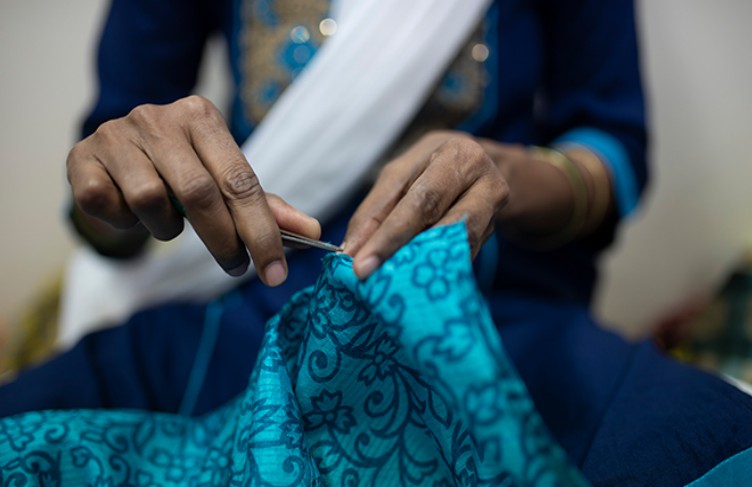Giving Old Indian Saris A New Life, ‘I Was A Sari’ Is Helping Underprivileged Women Design Their Future
- IWB Post
- June 4, 2019

“I forever lived in my village in Mumbai. I always wanted to go out on a vacation with my kids and my husband. Earlier, all the money my husband earned was barely enough to make ends meet. But now that I am financially independent as well, so with my saving now I can actually plan a vacation!” shared Nutan, one of the underprivileged women artisans working at I Was A Sari.
This is just one of the countless stories of women who are now turning their long-awaited dreams into reality and finally becoming the confident individual they always wanted to be. All because of the innovative brand I Was A Sari, started by Stefano Funari, who always wanted to
“make a real change in the life of every artisan involved.”
“Working here at I Was A Sari, I have learned the importance of finding one’s identity. I realized that there can be countless brands, but only some take a step to address the issues out there and that is the need of the hour. I always wanted to work with a venture which was not just a brand. It should be about fashion and marketing but also needs to have a purpose and meaning. And ‘I Was A Sari’ was the answer I was looking for and I fell in love with it,” says Poornima Pande, 33, Director of marketing and communications at I Was A Sari.
 Poornima Pande with Stefano Funari at ‘Circular Design Challenge Award’, India’s first award for Sustainable Fashion.
Poornima Pande with Stefano Funari at ‘Circular Design Challenge Award’, India’s first award for Sustainable Fashion.With an eco-ethical approach to fashion, the brand transforms old unique and coveted Indian saris into new styles, like bags, pouch, apparels, scarves, etc, with the help of women from underprivileged communities. Sharing the amazing concept on which I Was A Sari thrives on, Poornima maps out their path to a women-empowered India.
Excerpts:
How did ‘I Was A Sari’ come to be? How did you end up joining this amazing venture?
It was our founder Stefano Funari’s brainchild. He had been working with children at the time, doing social service and he realized that for the future of India to be bright, the women in the house need to be confident, empowered, and financially independent.
He had seen what women, who are regarded as weak and just limited to the kitchen, could sew, how they could transform one thing into another. So, once he was in a chorbazar and saw heaps of the most beautiful saris being sold and the idea of ‘I Was A Sari’ struck him, to be a brand about the most iconic garment in India, reviving the old charm and work for women’s empowerment as well.
Amazing concept, I must say. But these women artisans you work with, how do you come in contact with them?
We collaborate with NGOs: Community Outreach Programme and Animedh Charitable Trust via which we enlist these women. Also, generally in India women have basic stitching and tailoring skills, but even if they don’t, we give them entire proper training beforehand before they become a part of the production team.
As you must know, poverty is not the only problem these women are facing. There is the fact that they are, thanks to our patriarchal society, designated to look after the family and the children.
I would say that ‘I Was A Sari’ is giving them this kind of exposure for the first time, where they are getting to move out of their family and create their own identity. They never really got to let their individual self grow but now they have the opportunity to let their confidence take the reins of their life. Also, currently, we have joined hands with an NGO partner who has been interviewing these women in order to identify the issues that need solving, be it healthcare issues, education loan, provident fund.
We are a zero dividend initiative that invests all its profits back into developing the brand and above all, ensuring women’s empowerment. We are also coming up with classes for them, like some of them are really keen on learning English, Computer, so we want to provide them with weekly classes option for them. We really want to understand what their life is like, their problems, their wishes, and address them.
We also provide the women artisans with flexible working hours, like maybe they can only work when their kids are away at school i.e., for two hours or four hours. They may have guests at home one day and can’t come to work. So, our policy is work with us the number of hours you can in a day, no pressure.
You truly are aiming for a women-empowered India. Coming to the saris, where do you get these rare pieces of beauty?
One of the major areas is chor bazaars from where we source these saris. We also receive some donations of amazing pieces of beautiful saris. They are all second-hand, pre-loved saris. And the saris we don’t end up using are donated to another NGO, called Goonj, which makes sanitary pads and other upcycled products out of them, thus following our zero-waste policy.
- 0
- 0












